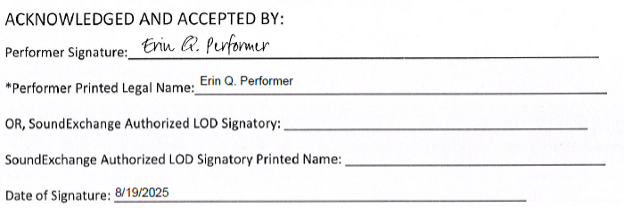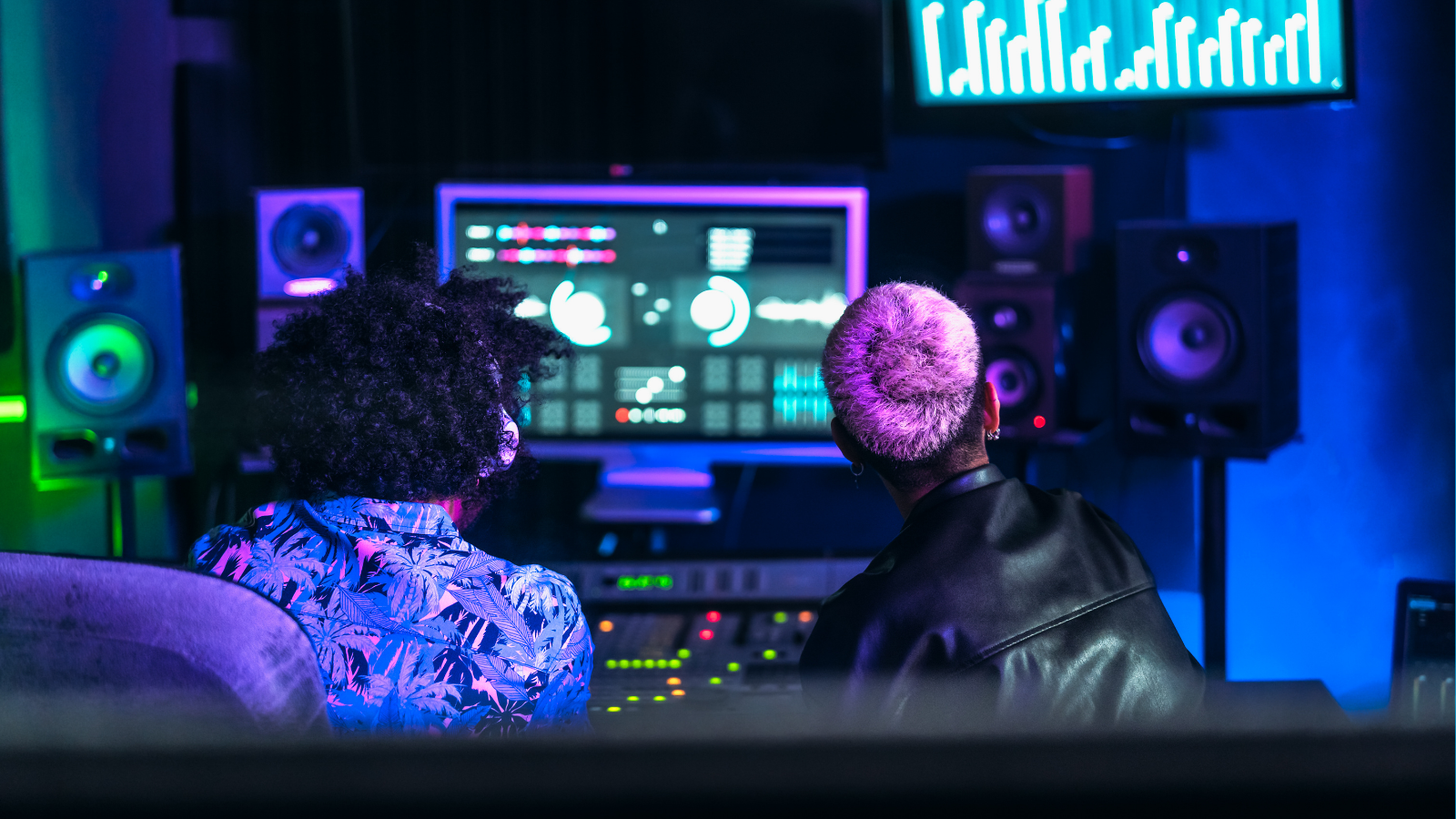LOD OVERVIEW
A Letter of Direction (or LOD) is a document by which a Featured Artist directs SoundExchange to pay a portion of the Featured Artist’s sound recording performance royalties to a participant in the creative process – such as a producer, mixer, or engineer. These will be referred to as Creative Participants from here forward.
The term “Featured Artist” generally refers to the individual(s) or group(s) most prominently featured on a track or album. Non-featured Artists, such as session musicians or backup singers, do not receive royalties directly from SoundExchange. LODs are powerful tools that divert earned royalties to another party. Thus, SoundExchange has specific requirements regarding signatures on LODs. The goal is to promote fairness, accuracy, and transparency for all parties – Featured Artists, Creative Participants, and their representatives. This post will focus on the signature requirements of LODs. For more general information, please refer to our LODs Overview page.
WHAT SIGNATURES DO LODs NEED?
For living performers, LODs must be signed by each performer who performed as part of the featured artist on the related repertoire OR signed by each performer’s authorized LOD Signatory (more on the LOD Signatory role further down in this blog post).
For example: if a recording is performed by a solo featured artist, any LODs for that track must be signed by that performer or by that performer’s LOD Signatory. If a recording is performed by a group, any LODs for that recording must be signed by each group member who performed on the recording OR by each group member’s LOD signatory.
Some recordings may contain multiple featured artists performing in collaboration. Let’s say a recording is performed by “Artist A featuring Artist B.” If the Creative Participant is seeking to receive payment on all royalties allocated to Artist A and Artist B for that recording, the Creative Participant would need to obtain signatures from both Artist A and Artist B (or their respective authorized LOD Signatories). SoundExchange can either honor one LOD signed by both Artist A and Artist B (or their LOD Signatories), OR separate LODs with a signature on behalf of one artist on each. If we process an LOD for one artist’s share and not the other, we’ll remind you to send in the other artist’s LOD once it’s signed.
WHO IS AN AUTHORIZED LOD SIGNATORY?
The Account Authorization Form allows a performer to designate a representative that will serve as the primary point of contact for the performer at SoundExchange. This representative will also serve as an LOD Signatory for that performer. There cannot be additional persons besides this primary point of contact (and the performer) authorized as LOD Signatories – so if a performer wants a third party to be able to sign LODs on their behalf, the performer must sign an Account Authorization Form authorizing that third party as the primary contact and LOD Signatory. In addition, SoundExchange does not recognize persons with power of attorney for a performer to be able to sign LODs unless they are also the primary contact on file for that performer.
WHAT ABOUT DECEASED PERFORMERS?
We sometimes receive Letters of Direction pertaining to recordings released by Featured Artists that include deceased performers. The following persons can sign LODs on behalf of deceased performers:
- The primary point of contact on the payee account to which the deceased performer’s royalties are sent (an estate, a company, etc.) or
- An heir, if the heir’s name is or is included in the name of the payee account to which the deceased performer’s royalties are sent
Heirs, surviving spouses, estate administrators / executors, etc., who do not qualify under one of the above are not authorized to sign LODs on behalf of deceased performers. In addition, in the circumstance that a deceased performer’s royalties are distributed among multiple recipient payees, each individual recipient would need to submit a signed LOD for the entire deceased performer’s share to be diverted to a Creative Participant.
WHAT ABOUT PERFORMERS WHO ARE MINORS?
SoundExchange cannot honor LODs with signatures from persons who are minors (under 18 years of age.) If a performer is a minor, SoundExchange needs a signature from either that performer’s parent / legal guardian, OR from an LOD Signatory that a parent / legal guardian has authorized. Once the performer turns 18, they can sign on their own behalf, and their parent / legal guardian will not be able to sign on their behalf unless they are subsequently designated by the performer as an LOD Signatory.
WHAT IF I’VE ASSIGNED MY ROYALTIES TO A THIRD PARTY?
Performers who have already worked with SoundExchange to assign their royalties for specific repertoire to a third party are no longer eligible to sign LODs for the assigned repertoire. LODs related to recordings for which the royalties have been assigned to a third party must be signed by a representative of the third party, NOT the performer or the performer’s authorized LOD Signatory. If you haven’t already gone through this assignments process, or have questions regarding it, please contact our Support team.
WHAT CONSTITUTES A COMPLIANT SIGNATURE?
LODs must be signed by the performer or their authorized LOD Signatory with the following types of signatures:
- A handwritten (“wet”) signature that matches the signature on file with SoundExchange from the performer’s government identification, OR
- An electronic signature (e.g. drawn with a stylus or finger, or entered via a signature service)
In situations where the signature of the performer or their LOD Signatory was signed using an electronic signature service like DocuSign, the DocuSign Certificate of Completion (or equivalent document if another electronic signature service is used) must be included with the LOD submission. The signature certificate must include the name and the unredacted email address of the signer (you may redact other information on the document like IP addresses, physical addresses, etc., if you prefer. SoundExchange uses and safeguards any personal information you provide to us in accordance with our Privacy Policy). Please note that any signatures that use an electronic “font” entered via an e-signature service as a signature would require a signature certificate.
Here’s an example of a handwritten “wet” signature that would not require a signature certificate. This was signed in ink and then scanned:

And here’s an example of a signature that WOULD require a signature certificate, since it was signed using an e-signature service (in this instance, DocuSign):

If we don’t have what we need to process an LOD, or if it’s unclear via which method an LOD was signed, SoundExchange will reach out for clarification.
QUESTIONS?
Have questions about Letters of Direction? Please contact our Support team via SXDirect or call us at 1-800-961-2091 (U.S.) or 1-202-803-8231 (outside of the U.S.). We are available from 9am to 6pm Eastern Time, Monday through Friday.
